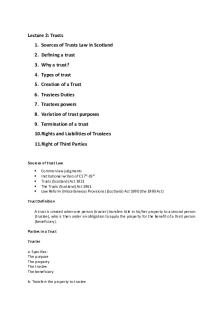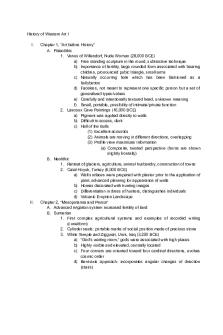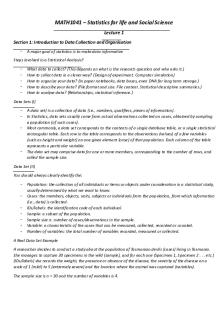AFRA Notes PDF

| Title | AFRA Notes |
|---|---|
| Author | Jasmine Comulada |
| Course | Twentieth- and Twenty-First Century African American Literature |
| Institution | University of Connecticut |
| Pages | 4 |
| File Size | 81.8 KB |
| File Type | |
| Total Downloads | 15 |
| Total Views | 138 |
Summary
reading notes...
Description
The Trial of Phillis Wheatley Why did the "most respectable characters in Boston" ask to meet with Phillis Wheatley in October 1772? They questioned the veracity of her claim to have written poetry. Which of the following sentences best summarizes Thomas Jefferson's opinion of Wheatley? He believed that although she wrote poetry, the inferior quality of the poetry proved the inferiority of the African race. What is a slave narrative? A literary genre in which slaves gave accounts of their lives in slavery, often including their time spent in slavery, escape, and heroism According to the philosopher David Hume, the difference between humans and apes lies primarily in their ability to think creatively.
Con't
Henry Louis Gates says that David Levering Lewis called the Harlem Renaissance "art as civil rights." What does Lewis mean and why does Gates bring this up? The writers and artists of the Harlem Renaissance sought to gain rights by proving their humanity. What was the main criticism of Phillis Wheatley by Seymour Gross, Amiri Baraka, Angelene Jamison, and other writers of the 1960s? Her message was too white. Black civil rights leaders of the 1960s used "On Being Brought from Africa to America" as evidence that Phillis Wheatley was a traitor to her race. Why does Gates include a discussion of Hume, Descartes, and other philosophers of the Enlightenment? to explain past perceptions of race and humanity.
Con't
Why did Gates chose to speak about the life and trials of Phillis Wheatley. Include information from his lecture that supports and presents his premise: the significance of the poetry of Phillis Wheatley. Phillis Wheatley, born in West Africa, was known to be the first published African-American female poet. She was sold as a slave by the age of eight and brought to North America. She was lucky to be brought by the Wheatley family in Boston. She was taught how to read and write. They encouraged her to learn the art of poetry upon noticing her potentials in the world of literature. In her poems, she wrote her life as a slave. Critics claimed that she was reluctant when writing poems about slavery. She wrote poems praising slavery since it brought her to Christianity. On the other hand, she said in her other poems that slavery was a cruel fate. Henry Louis Gates Jr. was interested to speak about the life and trials of Phillis Wheatley since he wanted to be both a literacy critic and a teacher at the same time. He has been an essential constituent to the black periodical literature project. The life and trials of Phillis Wheatley is part of the black culture and literature he is an advocate for.
Con't
Why does Gates consider Jefferson the "midwife" of African American literature? Jefferson's criticisms of Wheatley's work brought forth further African literature to dispute his views. Which of the following is a central idea in Gates' "Mister Jefferson and The Trials of Phillis Wheatley"? Criticism of Wheatley's work was based more on race than content. Jefferson's criticism of Wheatley inspired other Africans to demonstrate African equality....
Similar Free PDFs
Popular Institutions
- Tinajero National High School - Annex
- Politeknik Caltex Riau
- Yokohama City University
- SGT University
- University of Al-Qadisiyah
- Divine Word College of Vigan
- Techniek College Rotterdam
- Universidade de Santiago
- Universiti Teknologi MARA Cawangan Johor Kampus Pasir Gudang
- Poltekkes Kemenkes Yogyakarta
- Baguio City National High School
- Colegio san marcos
- preparatoria uno
- Centro de Bachillerato Tecnológico Industrial y de Servicios No. 107
- Dalian Maritime University
- Quang Trung Secondary School
- Colegio Tecnológico en Informática
- Corporación Regional de Educación Superior
- Grupo CEDVA
- Dar Al Uloom University
- Centro de Estudios Preuniversitarios de la Universidad Nacional de Ingeniería
- 上智大学
- Aakash International School, Nuna Majara
- San Felipe Neri Catholic School
- Kang Chiao International School - New Taipei City
- Misamis Occidental National High School
- Institución Educativa Escuela Normal Juan Ladrilleros
- Kolehiyo ng Pantukan
- Batanes State College
- Instituto Continental
- Sekolah Menengah Kejuruan Kesehatan Kaltara (Tarakan)
- Colegio de La Inmaculada Concepcion - Cebu















